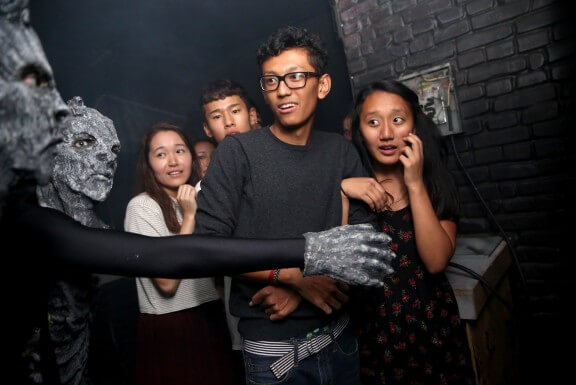 Audrey Tautou goes really, really unhappy in the classic lit adaptation “Therese.”
Audrey Tautou goes really, really unhappy in the classic lit adaptation “Therese.”
Credit: MPI Media Group
‘Therese’
Director: Claude Miller
Stars: Audrey Tautou, Gilles Lellouche
Rating: NR
2 (out of 5) Globes
Like many who’ve acquired massive success through a single performance, Audrey Tautou has tried like mad to avoid pigeonholing. Her post-“Amelie” career has been a succession of roles nothing like the wide-eyed gamine with perfect hair. “Dirty Pretty Things,” her first prominent role after her 2001 breakthrough, found her playing an immigrant abused in more ways than one. “Coco Before Chanel” found her shedding herself completely of joy and life, adopting the stern, strident tones of the famous designer.
“Therese” goes even further. Based on Francois Mauriac’s 1927 novel “Therese Desqueyroux” — the density of the surname gets made fun of by one of the characters, in a rare fit of humor — it casts her as a smart, independent-minded woman who marries for money and becomes bottomlessly miserable. Tautou’s Therese has no romantic expectations when she weds Bernard (Gilles Lellouche), portrayed as an oblivious lug who never seems to be aware that his bride looks permanently pissed.
Soon Therese’s friend and Bernard’s sister Anne (Anais Demoustier) does find passionate love, with a strapping Jewish man (Stanley Weber). This enrages Anne’s family, because they’re rabid anti-Semites. It also awakens something in Therese, whose jealousy materializes in an attempt to poison her wretched spouse, who takes a daily medication that includes a touch of arsenic. Suddenly, she finds herself with a possible way out of the biggest mistake she ever made.
Mauriac’s novel was previously filmed in 1962, with Emmanuelle Riva (“Amour”) in the lead, and directed by Georges Franju, of the magnificently cold and Gothic horror film “Eyes Without a Face.” Franju’s approach was to play the film in a more arch tone, giving it an almost darkly comedic bent. Late director Claude Miller, who died before this “Therese”’s debut, gives it a gentle, graceful, pastoral quality that’s pure taste. His method was exacting: Each shot feels immaculately chosen and is held for exactly as long as it should be.
But what could be called a “generic classic lit” approach isn’t ideal for a mordant tale. Franju had the right idea, and Tautou, try as she might, is no ice queen. (The character really calls for a Virginie Ledoyen or a Lea Seydoux.) She lets her puckered lips and harsh, narrow face freeze into a permanent scowl, but instead of a woman eaten away by the cruelties of a backwards age, she simply looks like a glum teenager. It’s a monotonous performance that makes one think, if she must avoid pigeonholing, she should avoid roles like this.
















